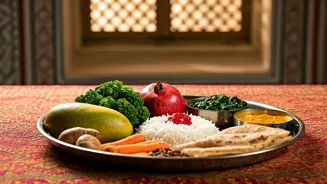Iron: The Energy Source
Iron deficiency, a widespread concern, often leads to anemia. Symptoms include fatigue, weakness, and shortness of breath. In India, where diverse diets
prevail, ensuring adequate iron intake through foods like spinach, lentils, and meat is crucial. Cultural diets play a big role in iron consumption and must be considered while making meal choices.
Iodine: Thyroid's Best Friend
Iodine is vital for thyroid function, which regulates metabolism. Deficiency can cause hypothyroidism, impacting energy levels and weight management. In India, iodized salt is promoted to combat iodine deficiency. Including seafood and dairy in your diet helps ensure you're getting enough of this essential nutrient for a healthy thyroid.
Vitamin D: Sunshine's Gift
Vitamin D, crucial for bone health, is often linked to exposure to the sun, yet many Indians are deficient. This deficiency can lead to bone pain, muscle weakness, and increased risk of fractures. Supplementing with vitamin D and incorporating foods like fortified milk and fatty fish is a good strategy.
Vitamin B12: The Nerve Booster
Vitamin B12 is essential for nerve function and red blood cell production. Deficiency may cause fatigue, nerve damage, and cognitive issues. Vegetarians and vegans in India should carefully monitor their B12 intake, as it's primarily found in animal products. Consider supplements or fortified foods to fill the gap.
Calcium: Bone Builder
Calcium is vital for bone health and also plays a part in muscle function. Deficiencies may cause weak bones and dental problems. Including dairy products, leafy greens, and calcium-fortified foods in your diet can help you meet your calcium needs. The Indian diet often already contains calcium through various sources.


















